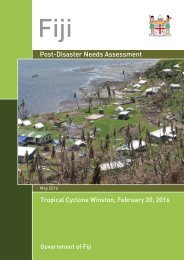Vanuatu_PDNA_Web
Vanuatu_PDNA_Web
Vanuatu_PDNA_Web
Create successful ePaper yourself
Turn your PDF publications into a flip-book with our unique Google optimized e-Paper software.
12 Tropical Cyclone Pam, March 2015<br />
Fiscal position after Cyclone Pam<br />
A fiscal scenario incorporating all currently available, relevant post-cyclone information presents a<br />
large forecasted net operating deficit for the GoV of VT 123.7 million in 2015, VT 940.7 million in<br />
2016 and VT 812.0 million in 2017. Including donor financing, the forecasted net operating surplus<br />
would amount to a total of VT 18.1 million in 2015, VT 940.7 million in 2016 and VT 812.0 million<br />
in 2017.<br />
However, taking into account that the reconstruction efforts will require substantial investment in<br />
fixed assets, this fiscal scenario shows an estimated net borrowing (or fiscal deficit) for the GoV of<br />
VT 5,548.5 million in 2015, VT 8,090.8 million in 2016 and VT 6,264.9 million in 2017. Considering<br />
donor financing, the combined net borrowing (or fiscal deficit) is now estimated at VT 11,296.7<br />
million in 2015, VT 14,918.9 million in 2016 and VT 13,956.0 million in 2017. Amore detailed<br />
picture of this fiscal scenario is provided in Annex 4.<br />
Revenues<br />
As of May 2015, Tropical Cyclone Pam had a number of effects on GoV revenues. While negative<br />
impacts on revenues manifest themselves in the form of revenues forgone under tax exemptions and<br />
losses in revenues due to the cyclone’s negative effect on GDP, the GoV also received an insurance<br />
pay-out from the Pacific Catastrophe Risk Insurance Pilot and donor grant funding from foreign<br />
governments and other organisations for relief operations.<br />
As mentioned above, on 14 th of March, the GoV granted VAT and duty exemptions on construction<br />
materials and gardening tools, in order to support the country’s reconstruction efforts. The revenues<br />
thus forgone will however also further aggravate the difficult fiscal and cash flow position of the GoV.<br />
These exemptions will stay in place until 12th June, i.e. for a total of 3 months.<br />
The effect of these exemptions on revenues from VAT and duties is hard to determine at this point, as<br />
several distinct forces are at play. Firstly, VAT is forgone due to the exemptions. Secondly, imports on<br />
both construction tools and gardening materials would be higher than usual after the cyclone due to<br />
increased demand for such goods. Thirdly, individuals may have spent money on the purchase of these<br />
reconstruction goods that they would have otherwise used to buy other consumption goods that are<br />
not currently VAT exempted. Finally, members of the <strong>Vanuatu</strong> National Provident Fund (VNPF) were<br />
authorised to withdraw 20% of their contributions and commercial banks deferred repayments of debt<br />
until three months. These measures increased household’s disposable income that could have led to<br />
higher spending on both reconstruction related materials and consumption goods.<br />
The long-term impact of the cyclone on revenues collected from VAT, duties and other revenues has<br />
yet to be estimated. Given the uncertainty surrounding the post-cyclone situation, it is currently too<br />
early to produce accurate forward projections.<br />
To date, the GoV has received grants worth VT 473.0 million. These financial resources are specifically<br />
intended to fund emergency relief operations and will be used, to the extent possible, to fund minor<br />
reconstruction or recovery operations. The GoV also received an insurance pay-out of VT 202.0<br />
million from the Pacific Catastrophe Risk Insurance Pilot (PCRIP) administered by the World Bank.



